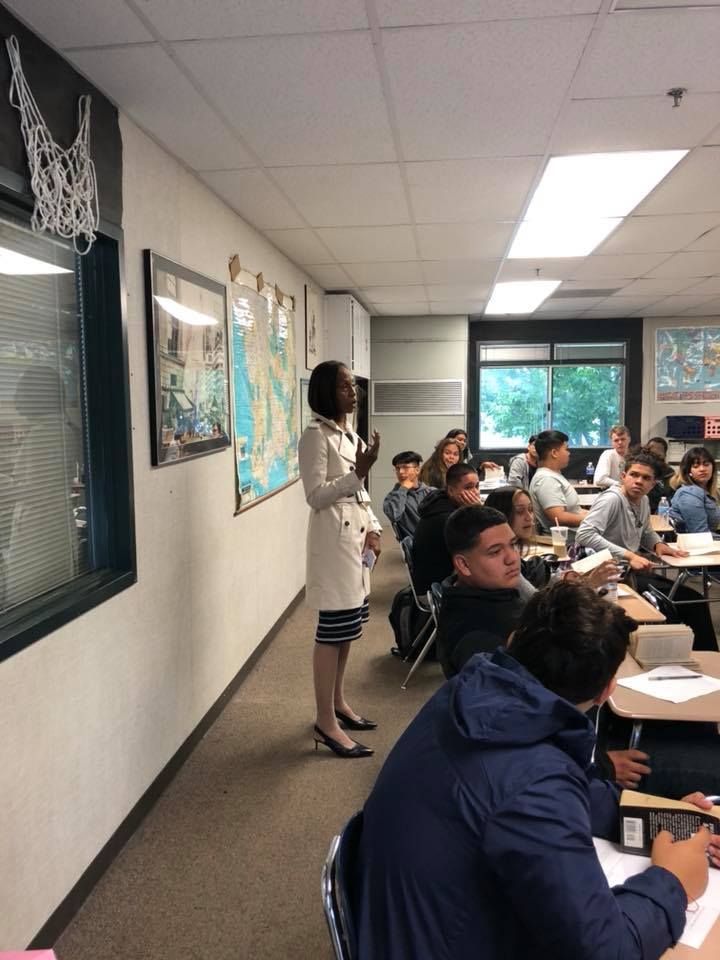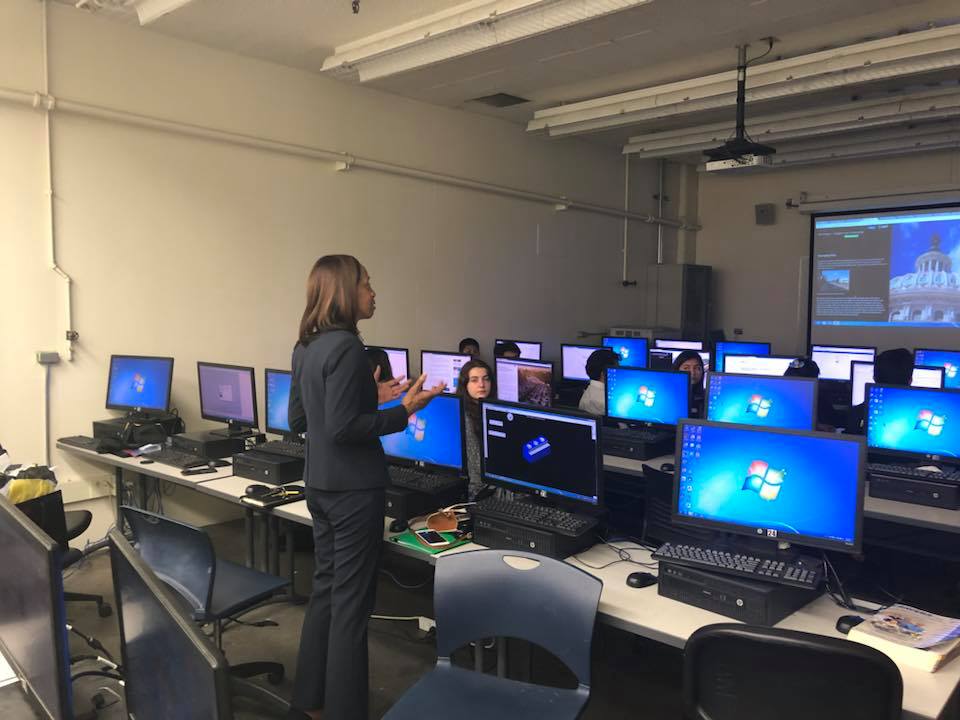News | Federal Highway Administration Leadership Visits LA-based Career Pathway Programs
Stop the VideoNews

PSR METRANS UTC
Federal Highway Administration Leadership Visits LA-based Career Pathway Programs
Thursday, September 6, 2018
 Virginia Tsu, Director of the Center for Transportation Workforce Development of the Federal Highway Administration (FHWA), recently visited the Los Angeles Trade Tech College’s (LATTC) Introduction to Geographic Information Systems (GIS) pilot course, developed in partnership with the Southwest Transportation Workforce Center (SWTWC). Tsu was able to experience firsthand the beginning stages of an active transportation career pathway and the products of SWTWC’s workforce development research.
Virginia Tsu, Director of the Center for Transportation Workforce Development of the Federal Highway Administration (FHWA), recently visited the Los Angeles Trade Tech College’s (LATTC) Introduction to Geographic Information Systems (GIS) pilot course, developed in partnership with the Southwest Transportation Workforce Center (SWTWC). Tsu was able to experience firsthand the beginning stages of an active transportation career pathway and the products of SWTWC’s workforce development research.
Career pathway development research shows that GIS skills are becoming highly sought out by employers; thus, creating and implementing introductory GIS curriculum has become a research priority for SWTWC. The LATTC GIS pilot course was set up to offer one such transportation planning curriculum where none formerly existed, demonstrating how students can use GIS as an entry to transportation planning career pathways. The LATTC pilot course also extends opportunities to K-12 students through the college's dual enrollment program.
The program, called ARC 341: GIS Metropolitan Access Planning Systems, introduces students to fundamental principles and concepts that reinforce the practice of geographic analysis with GIS, including: computer representation of geographic data, vector and raster data models, map projections, coordinate systems, spatial analysis, and map design. The course notably features an Esri collector app on students’ mobile devices, utilized during an engaging walk-audit activity in which the class collects and later analyzes geospatial data to assess the transportation systems around campus. In addition to these skills, ARC 341’s unique curriculum includes career pathway materials to point students beyond high school in the application of what they learn. After finishing this course, students are expected to apply their knowledge and skills to perform real-world tasks and solve problems.
As a final project during the class’ recently completed pilot run, students presented on transportation challenges they came across during their commutes from home to LATTC. Tsu observed the student final presentations, provided closing remarks, and presented students with their certificates of completion.
Tsu also visited the Port of Long Beach’s Academy of Global Logistics (AGL) at Cabrillo High School, another unique transportation career pathway program that offers in-class and out-of-class experiences to equip students with both the necessary knowledge and hands-on learning opportunities that are critical for industry work. AGL opens the door for students in an underserved neighborhood to step out confidently into the world with a clear path to a future career. During her visit from May 25-26, 2018, she also met with SWTWC leadership to discuss the future development of career pathway and workforce research.
 “A visit from a major federal funder is invaluable. At the end of the day, transportation workforce development is about empowering the next generation of workers so it was important for us to provide an experiential demonstration of K-12 learning. This is what a partnership between the federal government and a research center is all about—creating sustainable career pathways so people can enter into an industry that supports them,” SWTWC Associate Director Tyler Reeb said.
“A visit from a major federal funder is invaluable. At the end of the day, transportation workforce development is about empowering the next generation of workers so it was important for us to provide an experiential demonstration of K-12 learning. This is what a partnership between the federal government and a research center is all about—creating sustainable career pathways so people can enter into an industry that supports them,” SWTWC Associate Director Tyler Reeb said.
SWTWC leads the National Transportation Career Pathway Initiative (NTCPI) and is part of the National Network for the Transportation Workforce (NNTW), which comprises five regional transportation workforce centers funded by the Federal Highway Administration. Each of the five centers is dedicated to the development of the transportation workforce as well as certain disciplines unique to each center.
To read more about SWTWC, go to: www.swtwc.org
To read more about NNTW, go to: www.nntw.org
News Archive
- December (1)
- November (6)
- October (4)
- September (2)
- August (3)
- July (4)
- June (3)
- May (7)
- April (8)
- March (11)
- February (8)
- January (7)
- December (7)
- November (8)
- October (11)
- September (11)
- August (4)
- July (10)
- June (9)
- May (2)
- April (12)
- March (8)
- February (7)
- January (11)
- December (11)
- November (5)
- October (16)
- September (7)
- August (5)
- July (13)
- June (5)
- May (5)
- April (7)
- March (5)
- February (3)
- January (4)
- December (4)
- November (5)
- October (5)
- September (4)
- August (4)
- July (6)
- June (8)
- May (4)
- April (6)
- March (6)
- February (7)
- January (7)
- December (8)
- November (8)
- October (8)
- September (15)
- August (5)
- July (6)
- June (7)
- May (5)
- April (8)
- March (7)
- February (10)
- January (12)















